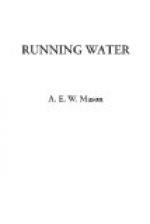Garratt Skinner rose from his seat.
“There, I have done,” he said. He looked at his daughter for a little while, his eyes dwelling upon her beauty with a certain pleasure, and even a certain wistfulness; he looked at her now much as she had been wont to look at him in the early days of the house in Dorsetshire. It was very plain that they were father and daughter.
“You are too good for your military man, my dear,” he said, with a smile. “Too pretty and too good. Don’t you let him forget it!” And suddenly he cried out with a burst of passion. “I wish to God you had never come near me!” And Sylvia, hearing the cry, remembered that on the Sunday evening when she had first come to the house in Hobart Place, her father had shown a particular hesitation, had felt some of that remorse of which she heard the full expression now, in welcoming her to his house and adapting her to his ends. She raised her downcast eyes and with outstretched hands took a step forward.
“Father!” she said. But her father was already gone. She heard his step upon the stairs.
Chayne, however, followed her father from the room and caught him up as he was leaving the hotel.
“I want to say,” he began with some difficulty, “that, if you are pressed at all for money—”
Garratt Skinner stopped him. He pulled some sovereigns out of one pocket and some banknotes out of another.
“You see, I have enough to go on with. In fact—” and he looked northward toward the mountains. Dimly they could be seen under the sickle of a new moon. “In fact, I propose to-morrow to take your friend Simond and cross on the high-level to Zermatt.”
“But afterward?” asked Chayne.
Garratt Skinner laughed and laughed like a boy. There was a rich anticipation of enjoyment in the sound.
“Afterward? I shall have a great time. I shall squeeze Mr. Jarvice. It’s what they call in America a cinch.”
And with a cheery good-night Garratt Skinner betook himself down the road.



